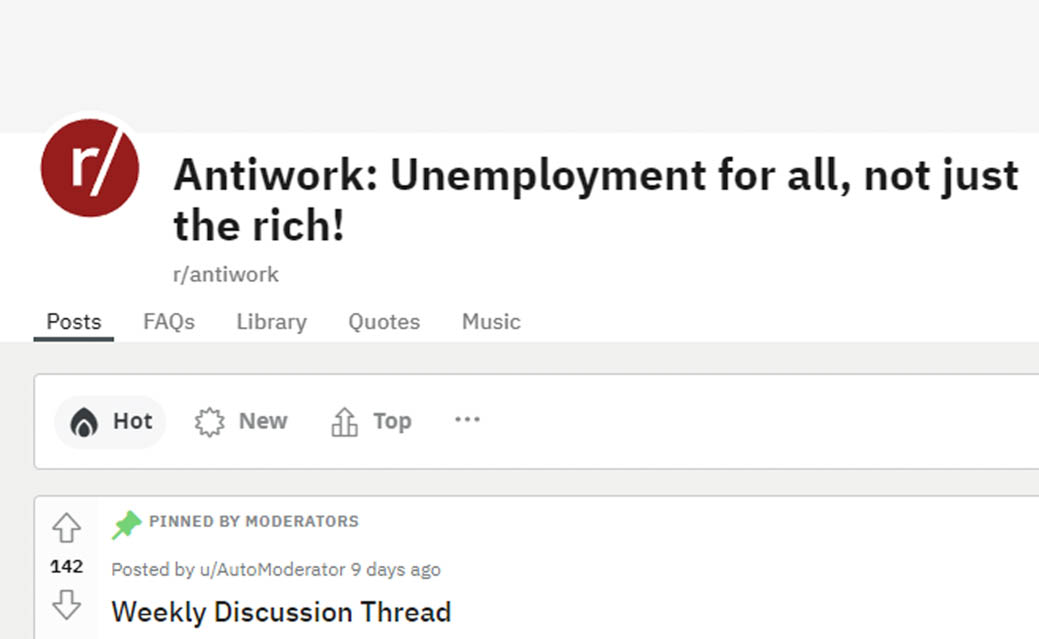All play and no work? The anti-work movement is a refreshing change from the status quo
Revolutionizing the dehumanising and exploitative capitalist work culture.
I’ll admit that as the end of my final year looms closer and the prospect of entering the job market becomes increasingly inevitable, I often find myself thinking, “At this point, unemployment might be preferable to the job search,”—a sentiment I know plenty of graduating students share. But unlike the odd pessimistic undergrad student like myself, the anti-work movement, which has garnered unexpected mainstream resonance within the last two years, is not a product of a just few disgruntled employees.
Drawing inspiration from a rich history of socialist and anarchist thought, the contemporary anti-work movement is a critique of both the concept of labour itself, and its inherently exploitative iteration under capitalism. While opposition to labour within this movement can take multiple forms, it is well encapsulated by three main criticisms: (1) the dehumanising and exploitative nature of work under capitalism, (2) the overproduction enabled by the emphasis on productivity in our culture, and (3) the negative effects of work on human health and happiness.
Despite being a largely fringe phenomenon for most of its existence, the anti-work movement attained newfound popularity during the Covid-19 pandemic when the ‘r/antiwork’ subreddit experienced unprecedented growth to become one of the fastest-growing communities on Reddit in 2020. It’s hard not to see why. When the pandemic hit, minimum wage workers, who had previously been regarded as unskilled, abruptly transformed into essential workers overnight, exposing the dependence of employers on the blood, sweat, and tears of their underpaid and overworked employees.
Immediately, it became clear that investments into a safe work environment, paid sick leave, and better pay was being withheld from workers, not because employers were financially incapable but because they lacked the incentive. This major shake-up in the labour market prompted many aggrieved workers to re-evaluate the place of work in their lives. Record numbers of workers exited the labour market in the “Great Resignation” and found refuge amongst the anti-work community online.
For those who have faced the miserable realities of the labour market for five, 10, or more than 15 years, the enthusiastic embrace of the anti-work movement is understandable. But for many university students at the brink of entering the job market, the premise of the anti-work movement may be hard to stomach. After all, most of us grew up being told that to be a productive member of society equates with joining the labour force.
The anti-work movement urges us to question this assumption. It might be easy to dismiss the movement’s critiques as fuss or an exaggeration, after all, you might argue that we are better off than the pre-industrial revolution workers, for whom labour protections like the eight-hour workday and weekends were non-existent. Yet, despite more than a century of labour movement progress, working conditions remain overwhelmingly abysmal for workers in the Global South and the “working poor” in the West. Even the so-called cushy white-collar jobs that we all strive for require us to sacrifice a significant chunk of our time, energy, and in many cases, happiness, to generate profit for a stranger.
Whether you subscribe to the anti-work movement’s beliefs or not, the movement is a good thing for all workers. It means that workers are actively demanding their due—better pay, benefits, and labour protections that prevent routine violations of a worker’s dignity. Just this past December, in an incredible display of working-class solidarity that would have made Karl Marx proud, the anti-work movement on Reddit successfully mobilised to aid the Kellogg workers strike in negotiating for better working conditions and pay.
It remains to be seen whether the anti-work movement can sustain its momentum beyond the pandemic and make the stance against work more readily accepted in the popular discourse. But for now, the class consciousness it is encouraging amongst workers is, in my view, impressive enough. It suggests that this may be the first step in eliminating the inhumane working conditions employees are subject to in a system that incentivizes the ruthless pursuit of profit.


Great article!
Thank you so much!